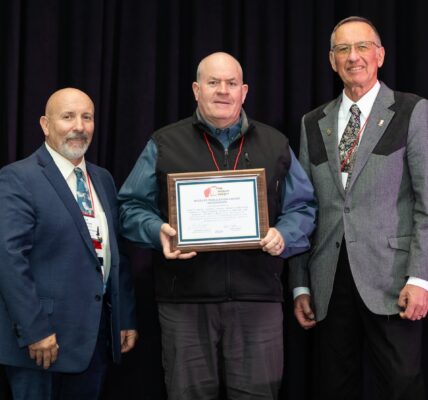
By Victoria Eavis and Maya Shimizu Harris
Casper Star-Tribune
Via- Wyoming News Exchange
CASPER — With less than a week before primary day in Wyoming, state candidates’ fundraising numbers were released, giving a look at how much money they’ve been collecting and spending.
Wyoming’s midterm elections are taking place Tuesday, when offices like governor, secretary of state, and superintendent of public instruction will be up for grabs.
In two of those three, there is not a true incumbent running, opening up the field to heated races.
Secretary of State Ed Buchanan is not running for reelection, having sought and obtained a position as a judge in Goshen County. Now, Sen. Tara Nethercott, R-Cheyenne, is battling it out with Rep. Chuck Gray, R-Casper for the secretary’s seat.
Former Superintendent of Public Instruction Jillian Balow resigned to take the same job in Virginia earlier this year, which meant that the Wyoming Republican Party was tasked with filling the seat.
The party’s central committee selected three candidates, of which Gov. Mark Gordon appointed Brian Schroeder, who is now running to be elected to the post.
Because Schroder is unelected but has held office for a few months, he has some advantage of incumbency on his side, but likely not as much as someone who served a full term in office and was elected by voters.
Former President Donald Trump threw his support behind the two most hard-line Republicans in those races: Schroeder for superintendent and Gray for secretary of state.
Gov. Mark Gordon, on the other hand, is facing multiple challengers to his right in his run for reelection.
Gray’s campaign collected roughly $528,000 to Nethercott’s $333,000, according to campaign finance reports released by the secretary of state’s office.
But Nethercott collected more in individual donations ($181,350) than Gray ($17,480).
Gray’s father, Jan Charles Gray, donated $500,000 to his campaign, the records show. Gray himself donated $10,000 to his own campaign.
Nethercott also loaned her campaign $95,000, which she says was “necessary to start [the] campaign.”
“I am humbled and grateful for the financial support from the generous and hard working men and women of Wyoming,” she said. “This campaign would not be possible without their support.”
Excluding Gray’s or Nethercott’s own donations or immediate familial donations (Nethercott also had a cousin who donated $2,500) Nethercott out-raised Gray by roughly 10 to 1.
Both candidates have just over $96,000 left in the bank to spend.
Some of the big names that donated to Gray were Dan and Carleen Brophy, two wealthy political donors, in addition to Susan Gore, founder of Wyoming Liberty Group and the Gore-Tex heiress, who was accused in a New York Times investigative piece last year of funding a political spying operation in the state.
Gray also received donations from Rep. Tim Hallinan, R-Gillette, Sen. Tim French, R-Powell as well as Donna Rice, a member of Wyoming Republican Party leadership.
Nethercott received donations from over a dozen Republican legislators plus three Democratic lawmakers: Rep. Andy Schwartz, D-Jackson, Rep. Cathy Connolly, D-Laramie, and former Sen. Liisa Anselmi-Dalton.
Nethercott also took almost $55,000 from political action committees, the records show. Gray collected $500 in PAC money.
“President Trump has endorsed our campaign because I support voter integrity measures and passed the voter ID bill,” Gray said in a statement. “But the insider establishment has big money in Wyoming to support candidates like Liz Cheney and Tara Nethercott, including with PAC dollars. They’re teaming up with the Star Tribune to put out false, defamatory stories that serve as a contribution to the Nethercott campaign worth hundreds of thousands of dollars — l’m grateful to my family for stepping up to counter these liberal attacks with funds from family businesses that I helped to build.”
Gray and Nethercott have emerged as candidates on opposite sides of the debate on election integrity.
Gray is running as a 2020 presidential election skeptic, saying that there was more fraud than the margin of votes between Trump and President Joe Biden. Gray is pushing to ban ballot drop boxes, which have become a target after the movie “2000 Mules” was released, a film that alleges widespread voter fraud in the 2020 presidential election. Gray has also sponsored numerous showings of the movie throughout Wyoming while on the campaign trail.
Nethercott says that there is “no objective evidence” to prove that the 2020 election was stolen for President Joe Biden, and she repeatedly emphasizes her confidence in Wyoming’s elections.
According to a database maintained by the right-leaning Heritage Foundation, Wyoming has seen just three instances (involving four people) of voter fraud in 40 years, and none since 2014.
Once again, Gordon is facing multiple opponents to the right of him politically.
The governor brought in about $541,000. Of that, $392,800 of that came from individual donors — the sitting governor received $100,000 in loans from his wife and $45,000 from PACs (about 80% of that came from PACs outside Wyoming).
In the 2018 gubernatorial primary, Gordon came out on top of a crowded field with only 33% of the vote, helping to spur an unsuccessful movement from the right to enact run-off elections.
Gordon is not well liked by some on the far right in Wyoming. Multiple times during a recent gubernatorial debate, Gordon made sure to point out that he is “a Republican, and a conservative Republican at that.”
Gordon is being challenged by retired Marine Brent Bien who reported nearly $100,000, records show. Over a third of that was from him or his immediate family. Bien himself donated over $31,000.
From individual donors, Bien garnered about $54,000.
“Brent and Sue have been blessed to have great careers that have allowed Brent to pursue service including using his own money to travel the state and meet voters where they are,” said Sam Rubino, Bien’s campaign manager. “This campaign has always been about the hard working people of Wyoming, not millionaires and political donors.”
Veterinarian and serial political candidate Rex Rammell, on the other hand, only raised $9,200 from individuals while loaning his campaign over $66,000.
Rammell has a colorful history, including criminal charges and multiple bids for office in Wyoming and Idaho. He ran for Wyoming’s governor in 2018 as a Constitution Party candidate and made multiple runs in Idaho.
During the recent debate, Rammell used his closing statement to accuse Bien of not meeting state constitutional requirements needed to hold the office of governor.
To run for governor, a candidate must reside in the state for five years, but according to the state constitution, residency is not lost by military service, and Bien — who recently moved back to Wyoming after serving in the military — said he maintained his residency throughout his time in the Marines.
Rammell filed a complaint with the Wyoming Secretary of State’s office, which responded by closing it without taking action because the complaint “seeks a legal analysis of the term residency which goes beyond that contained in the current statutes.”
Megan Degenfelder, formerly chief policy officer at the education department and currently the government and regulatory affairs manager for Morningstar Partners Oil & Gas, raised nearly $130,000 from individuals, plus about $10,000 from her immediate family and $70,000 in loans of her own money.
“It is clear that Wyoming voters want conservative elected officials they can count on, who have actually lived in and contributed to our communities and who focus on issues that matter to our state. As a lifelong Wyomingite, I am that candidate. I will be accountable to the taxpayers of this state and I will work tirelessly to prepare students for successful futures in Wyoming,” Degenfelder said in a recent press release.
She also received a significant amount of PAC money — $23,050.
“The primary PAC donations came from Wyoming industries that represent the workforce that students are eventually going to be entering into,” Degenfelder said. “It shows that they’ve decided that I’m the candidate who’s most likely to understand the needs of industry.”
Like Schroeder, Degenfelder also applied to be the interim superintendent when Balow resigned, but ultimately got fourth in the central committee’s vote.
Degenfelder also received the endorsement of former U.S. Sen. Al Simpson, a Wyoming political icon who recently received the presidential medal of freedom, U.S. Senator Cynthia Lummis and more than 20 current lawmakers, according to a campaign press release.
Trump-endorsed Schroeder trailed Degenfelder in individual donations, raising less than $27,000 from individuals who aren’t himself or family. Some of that money came from Gore, Hallinan and former state representative Marti Halverson (who was also a finalist for the superintendent position earlier this year).
Schroeder is the former head of Veritas Academy, a private Christian school in Cody, and has experience as a family and youth coordinator and as a teacher and administrator in private schools in California, Wisconsin, Michigan and Wyoming.
He’s deeply conservative; he’s called for Wyoming to enact a law similar to Florida’s Parental Rights in Education Act, which, among other things, “prohibits classroom discussion about sexual orientation or gender identity in certain grade levels.”
He advocates for more parental control in public schools. He opposes the teaching of critical race theory (which is not currently taught in Wyoming public schools).
The other Republican candidate in the superintendent race is Casper-based substitute teacher and cosmetologist Jennifer Zerba, who raised only $300 from two individuals.
While fundraising is one indication of a candidate’s viability, it is not infrequent that those who outraise their opponents lose the election. Early voting is ongoing and primary day is Tuesday.




